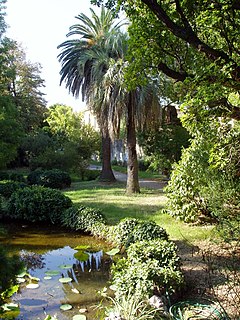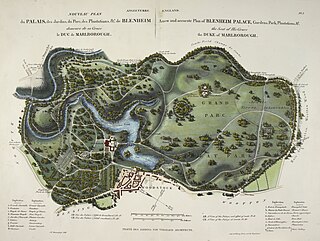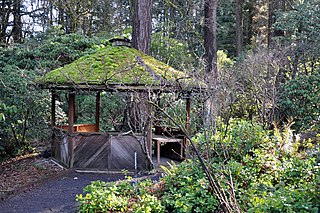Related Research Articles

A botanical garden or botanic garden is a garden dedicated to the collection, cultivation, preservation and display of a wide range of plants labelled with their botanical names. It may contain specialist plant collections such as cacti and other succulent plants, herb gardens, plants from particular parts of the world, and so on; there may be greenhouses, shadehouses, again with special collections such as tropical plants, alpine plants, or other exotic plants. Visitor services at a botanical garden might include tours, educational displays, art exhibitions, book rooms, open-air theatrical and musical performances, and other entertainment.
This page gives an overview of the complex structure of environmental and cultural conservation in the United Kingdom.

Horticulture is the agriculture of plants, mainly for food, materials, comfort and beauty for decoration. Horticulturists apply knowledge, skills, and technologies to grow intensively produced plants for human food and non-food uses and for personal or social needs. Their work involves plant propagation and cultivation with the aim of improving plant growth, yields, quality, nutritional value and resistance to insects, diseases and environmental stresses. They work as gardeners, growers, therapists, designers, and technical advisors in the food and non-food sectors of horticulture.

Bedgebury National Pinetum at Bedgebury, Kent, in the United Kingdom, is a recreational and conservational arboretum and, with the National Arboretum at Westonbirt, comprises the UK National Arboreta. It was established as the National Conifer Collection in 1925 and is now recognised as the most complete collection of conifers on one site anywhere in the world. The collection has over 10,000 trees growing across 320 acres (1.3 km2), including rare, endangered and historically important specimens. Bedgebury National Pinetum conducts conservation work and is home to some 56 vulnerable or critically endangered species and houses five NCCPG National Plant Collections.
The National Plant Collection scheme is the main conservation vehicle whereby the Plant Heritage, formerly National Council for the Conservation of Plants and Gardens (NCCPG) can accomplish its mission: to conserve, grow, propagate, document and make available the resource of garden plants that exists in the United Kingdom.
The 'Head Gardener' is an individual who manages all horticultural aspects of a property or garden including staff and volunteers. The properties they manage include Historic Gardens and Private estates, as well as amenity horticulture teams, for example, with a County Council. The remit of a Head Gardener, and the required experience varies between roles and properties however it must be acknowledged that Head Gardeners would normally be educated to an exceptionally high level within their field and have many years of experience to support that education. In the UK, Kew Gardens, Capel Manor College and other professional educational establishments run training courses with qualifications enabling the professional development of Gardeners. The Royal Horticultural Society is a one such leader in the provision of horticultural training with many professional gardeners securing Diplomas and Master of Horticulture degrees under their training courses. Horticulture is a highly skilled career. The fundamental horticultural aspects of managing a garden include, and are not limited to Propagation, Productive Growing, commercial horticulture, landscaping- both hard and soft, Pest, disease and plant health management including a sound understanding of plant passport regulations as well as a world wide understanding of preventing the spread of invasive diseases, plants and pests. Managing a team of volunteers is often an aspect of this role within public gardens or charity spaces such as The National Trust or English Heritage. This is a very brief summary of the role and this varies between gardens.

Desert Botanical Garden is a 140-acre (57 ha) botanical garden located in Papago Park, at 1201 N. Galvin Parkway in Phoenix, central Arizona.

The Royal Botanic Garden, Sydney is a heritage-listed major 30-hectare (74-acre) botanical garden, event venue and public recreation area located at Farm Cove on the eastern fringe of the Sydney central business district, in the City of Sydney local government area of New South Wales, Australia.
The Royal New Zealand Institute of Horticulture (RNZIH) is a horticultural society in New Zealand.

Exbury Gardens is a garden in Hampshire, England, belonging to a branch of the Rothschild family. It is situated in the village of Exbury, just to the east of Beaulieu across the river from Bucklers Hard. It is well signposted from Beaulieu and from the A326 Southampton to Fawley road in the New Forest. The gardens are rated Grade II* on the National Register of Historic Parks and Gardens.

Historic garden conservation is a specialised type of historic preservation and conservation or restoration concerned with historical and landmark gardens and designed landscapes.
The Chicago Botanic Garden is a 385-acre (156 ha) living plant museum situated on nine islands in the Cook County Forest Preserves. It features 27 display gardens in four natural habitats: McDonald Woods, Dixon Prairie, Skokie River Corridor, and Lakes and Shores. The address for the garden is 1000 Lake Cook Road, Glencoe, Illinois. The garden is open every day of the year. Admission is free, but parking is $30 per car.

Berry Botanic Garden was a botanical garden in southwest Portland, Oregon, in the United States. In addition to large collections of alpine plants, rhododendrons, primulas, and lilies, it was known for its plant-conservation program and its large seed bank that protects rare or endangered plants of the Pacific Northwest. The seed bank, formally established in 1983, was thought to be the first in the U.S. that was devoted entirely to preserving rare native plants.

The Sir Harold Hillier Gardens is an arboretum comprising 72 hectares accommodating over 42,000 trees and shrubs in about 12,000 taxa, notably a collection of oaks, camellia, magnolia and rhododendron.

Paignton Zoo is a zoo in Paignton, Devon, England. The zoo is part of South West Environmental Parks Ltd which is owned by Wild Planet Trust, formerly known as the Whitley Wildlife Conservation Trust (WWCT). Wild Planet Trust also runs Living Coasts in Torquay, Devon and Newquay Zoo in Newquay, Cornwall. All three are registered charities.

Bennetts Water Gardens is an 8-acre (32,000 m2) garden in Chickerell, near Weymouth, Dorset, in southern England. It holds national and international collections of water lilies which flower from late May through to September. The plants are displayed in a series of ponds and lakes. A main feature of the garden is a blue Japanese bridge built in 1999 to celebrate 100 years since Claude Monet painted his famous piece Water Lily Pond 1899.

Batsford Arboretum is a 55-acre (220,000 m2) arboretum and botanical garden near Batsford in Gloucestershire, England, about 1½ miles north-west of Moreton-in-Marsh. It is owned and run by the Batsford Foundation, a registered charity, and is open to the public daily throughout most of the year.

Janet Meakin Poor was a landscape design specialist based out of Winnetka, Illinois. She was the great great niece of the famous American impressionist painter Lewis Henry Meakin.
The Garden History Society was an organisation in the United Kingdom established to study garden history and to protect historic gardens. Since 2015 it became part of The Gardens Trust, having merged with the Association of Gardens Trusts.
Maggie Campbell-Culver is a garden and plant historian, and a Fellow of The Linnaean Society of London. She has worked on a number of gardens in Sussex and Cornwall, and was the Garden Conservationist at Fishbourne Roman Palace near Chichester.